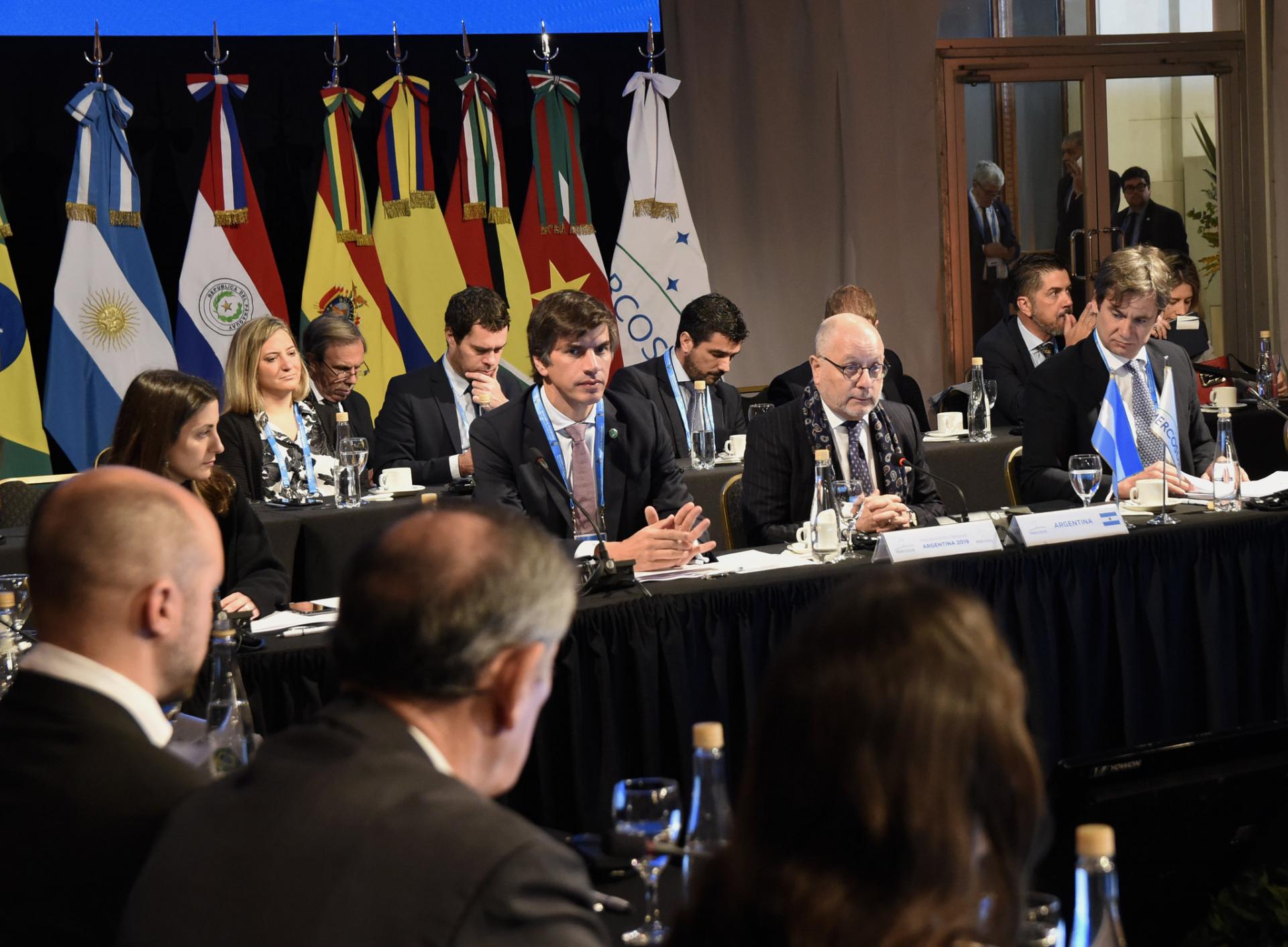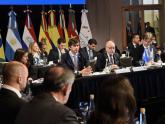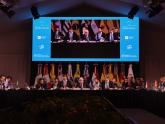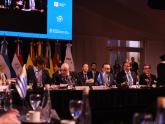Today, Foreign Minister Jorge Faurie opened the Plenary Session of Foreign Ministers of the 54th Summit of MERCOSUR, gathered in session of the Common Market Council, which is being held at historical Belgrano Station in the city of Santa Fe. There, he urged Mercosur to "strengthen its political agenda, which is associated with its stronger presence in the economic and trade fields," since the agreement reached with the European Union.
The Argentine Foreign Minister stated that the agreement is "a turning point for the domestic and foreign policy agenda" of the bloc made up of Argentina, Brazil, Paraguay and Uruguay. Foreign Ministers Ernesto Fraga Araujo, Luis Alberto Castiglioni and Rodolfo Nin Novoa participated in the Plenary Session.
In turn, the Secretary for International Economic Relations of the Foreign Ministry, Horacio Reyser, underscored important achievements which offer opportunities and new challenges to MERCOSUR, which were a result of the joint work carried out with the partners during Argentina's presidency. In the report prepared by Argentina's PPT, Reyser pointed out the following facts:
Argentina assumed the Presidency Pro Tempore of MERCOSUR with a specific purpose: to make MERCOSUR more dynamic. Thus, we suggested three lines of work to the partners:
• reforming and strengthening the institutional structure of MERCOSUR
• expanding the economic and trade agenda
• reaching specific agreements to materialize the external negotiations agenda
First of all, after almost twenty years of negotiations, we reached an agreement with the European Union which sets the principles of the Strategic Partnership Agreement between MERCOSUR and the EU in terms of access to markets of goods, services and government procurement, and the different chapters that make up the final agreement. This is a milestone for the international integration of MERCOSUR and a turning point for the bloc. It constitutes strategic progress made to integrate our economies with the world's largest market, improve our production standards, and create quality jobs in the region. We believe that this agreement will we one of the drivers of growth in our countries in the following years.
In addition, the foreign policy agenda has been active with regard to other sectors. We held meetings and video conferences with Canada, Korea, EFTA, Singapore and Vietnam. We are making speedy progress in all cases to conclude new agreements, and I believe that the successful negotiation with the European Union will give us the momentum we need to do so.
Apart from the foreign policy agenda, significant progress has been made this semester as regards the domestic agenda of MERCOSUR. Thanks to the political determination and negotiation efforts made by all the Member States, we have accomplished important things for our integration process and, especially, for our citizens. These are some of the main results:
• The Agreement to Eliminate International Roaming Charges for Final Consumers of MERCOSUR, which will reduce communications costs and make our citizens' lives easier, as they increasingly travel across our countries and need to be connected.
• The Ad Hoc Group for the Examination of the Consistency and Dispersion of the Common External Tariff began working with a view to modifying the current CET so that our economies become more productive and competitive at the international level. This is an essential task for the bloc because the CET is one of our founding instruments. This is historic because it is the first time we have addressed the task of fully reviewing CET since it was established 25 years ago.
• An understanding has been reached with FONPLATA to sign a Trust Agreement seeking to improve the management of the financial resources of the MERCOSUR Structural Convergence Fund (FOCEM), a tool which has led to good results since it was created, more than ten years ago. It is important to note that the Fund has funded more than fifty projects in our countries, so any measure we take to strengthen it will positively impact our economies.
• A Regulatory Framework for a MERCOSUR Budget has been approved, which includes the current budgets of the different bodies of the bloc which need funding and the special funds, except the MERCOSUR Parliament and FOCEM. This is a necessary and long-delayed improvement for the structure of the bloc to operate in an organized and efficient way which we finally managed to achieve this semester thanks to the joint work of all the countries. It is worth mentioning that efficient public administration is a duty owed to our fellow citizens and this Framework is headed in that direction.
• The institutional structure of MERCOSUR as regards technical and consultative forums was rationalized by eliminating bodies which were inactive or had achieved the goal for which they were created. In addition, some forums which were competent in overlapping fields were merged with a view to making the operation of the MERCOSUR bodies more dynamic and eliminating unnecessary bureaucratic steps.
• The Guidelines for the Health Work in Borders Plan for MERCOSUR, which will serve as a guide in public health actions and interventions in MERCOSUR border areas and in its relationship with Associate States, was approved.
• The "Regional Plan to Eradicate and Prevent Forced Labour and Human Trafficking for the Purpose of Labour Exploitation", and the "Regional Plan for the Labour Inspection of MERCOSUR: Origin, dimensions and actions", which promotes joint inspections of the work conducted in border areas, were approved.
I believe that useful achievements for MERCOSUR have resulted from this Presidency. Some of them are historic, such as the agreement with the European Union. Some others are less revolutionary but still entail progress, such as those related to the domestic agenda of the bloc. Still, all of them, both from a domestic and a foreign standpoint, both in economic and social terms, have the same goal: to adapt our countries to the changing international situation, to make sure MERCOSUR retains its role as a tool for the development of our economies, and to ultimately allow our citizens to improve the quality of life and look to the future with hope.





